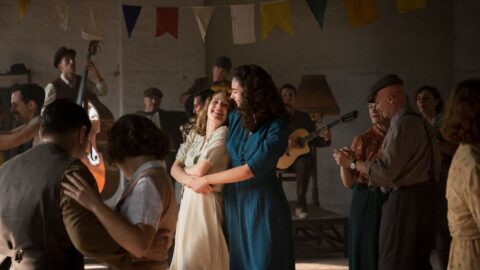Women posing nude for men embody something of a paradox. On the one hand, they’re free and proudly showing off their bodies and sexuality. On the other, they’re giving men the chance to objectify them, to reduce them to their parts. Still, the female nude persists as a key part of art history. A famous Guerrilla Girls poster from 1989 asks: “Do women have to be naked to get into the Met. Museum?” stating that while less than five percent of artists at the New York Metropolitan Museum are women, 85% of nudes are of female bodies. Historically speaking, women seem to be more the subject of art than its creators.
The same goes for film. Emmanuelle Béart is naked for much of the runtime of Jacques Rivette’s captivating masterpiece La Belle Noiseuse (1991), studiously drawn by Michel Piccoli. And Leonardo DiCaprio captures the curves of Kate Winslet in The Titanic (James Cameron, 1997) after her character implores him to paint her like one of his French girls. The reverse, a man painted by a woman, his privates freely hanging, has rarely (if at all?) been committed to film. While men are uglier, that’s probably only half of the problem!

There’s the start of a fresh conversation, but certainly not the development of one.
—
Turin, 1938. Ginia (Yile Yara Vianello) is a seamstress with passion beyond her means. She lives with her brother Severino (Nicolas Maupas), who never appears to leave the flat (yet still expects her to cook) — existing primarily to tell her what she is doing wrong with her life. Things take a sparkling turn when the gorgeous Amelia (Deva Cassel) turns up. She’s announced in dramatic fashion, jumping off a little boat on a lake and swimming up to Ginia and her friends amorously. Langorously. It makes sense. It’s a beautiful summer!
Deva Cassel, the ultimate nepo-child of both Vincent Cassel and Monica Bellucci, shines in her debut role: not only is she beautiful; she has the grace and poise of a natural movie star. If Beautiful Summer is not much to write home about, then it’s worth noting Cassel here. With parents like that, you’re certainly going to see the 18-year-old again (she’s already been cast in Netflix’s remake of The Leopard (Luchino Visconti, 1963) with Luchetti hired to direct.)
Ginia, like casting agents around the world (probably), is also obsessed with Amelia. A virgin, she’s also completely tantalised by Amelia’s profession as a nude model. Thankfully for her, they become fast friends, and Ginia is introduced into the chaos of Turin’s bohemian world on the cusp of WW2. It’s a shame then, that when presenting us with all these opportunities, Beautiful Summer goes down the sickness route, clumsily flirting with a lame “bury your gays” trope while having little new to say about it.
In fact, Beautiful Summer follows cinema trope 101, which is if someone coughs in the first act, there’s a high chance that they might not make it to the end of the film. (No one just coughs randomly for the sake of it, unless you count Woody Allen doing his stammering act.) Clichéd to a fault, and lacking in urgency, Beautiful Summer holds up the objectification of women, starts a conversation, points towards a new solution, and then does nothing with it. For one thing, there are zero male nudes.
Redmond is the editor-in-chief of Journey Into Cinema.
